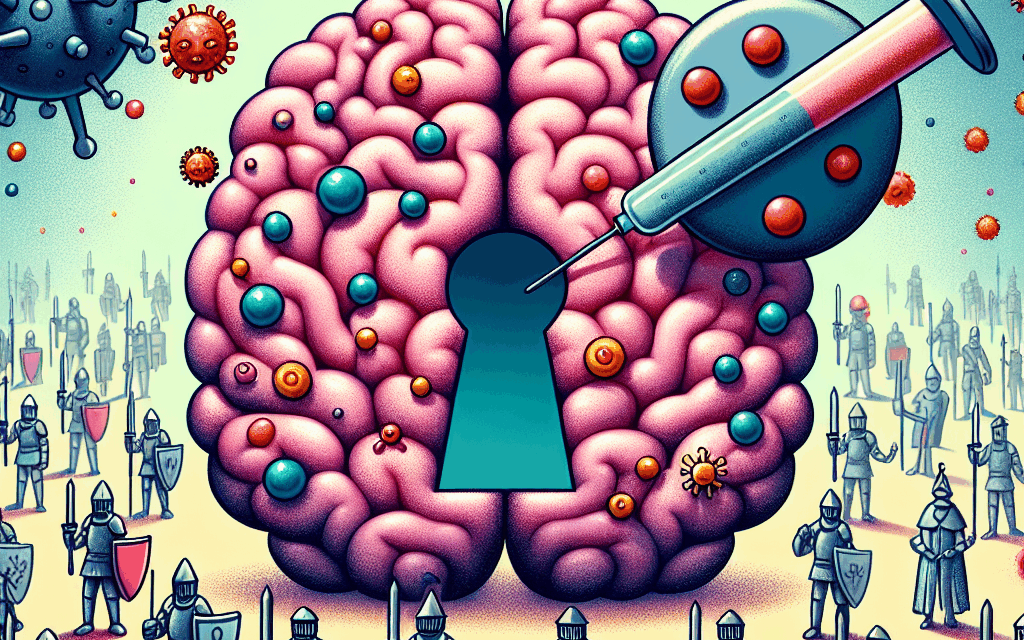Unlocking Mental Health: The Immune System’s Role in Treatment
Mental health has become a focal point in contemporary healthcare discussions, with increasing recognition of its complexity and the multifaceted factors that contribute to mental well-being. One of the most intriguing areas of research is the interplay between the immune system and mental health. This article delves into the significant role the immune system plays in mental health treatment, exploring how inflammation, immune responses, and gut health can influence psychological conditions. We will examine five key subtopics: the connection between inflammation and mental health, the gut-brain axis, the role of cytokines, the impact of stress on immune function, and emerging therapies targeting the immune system.
The Connection Between Inflammation and Mental Health
Inflammation is a natural response of the immune system to injury or infection, but chronic inflammation has been linked to various mental health disorders, including depression, anxiety, and schizophrenia. Research indicates that individuals with these conditions often exhibit elevated levels of inflammatory markers in their blood.
One of the most compelling studies published in the journal JAMA Psychiatry found that individuals with major depressive disorder had significantly higher levels of C-reactive protein (CRP), a marker of inflammation, compared to healthy controls. This suggests that inflammation may not only be a consequence of mental illness but could also play a role in its onset and progression.
- Biological Mechanisms: The biological mechanisms linking inflammation to mental health are complex. Inflammatory cytokines can affect neurotransmitter metabolism, particularly serotonin and dopamine, which are crucial for mood regulation. For instance, elevated levels of interleukin-6 (IL-6) have been associated with reduced serotonin levels, potentially leading to depressive symptoms.
- Neuroinflammation: Neuroinflammation, or inflammation within the brain, is another critical area of study. Microglia, the brain’s immune cells, can become activated in response to inflammatory signals, leading to neuronal damage and altered synaptic function. This process has been implicated in the pathophysiology of various psychiatric disorders.
- Clinical Implications: Understanding the link between inflammation and mental health opens new avenues for treatment. Anti-inflammatory medications, such as non-steroidal anti-inflammatory drugs (NSAIDs) and cytokine inhibitors, are being investigated for their potential to alleviate symptoms of depression and anxiety.
In summary, the connection between inflammation and mental health is a burgeoning field of research that highlights the importance of considering immune responses in the treatment of psychological disorders. By addressing inflammation, we may unlock new therapeutic strategies that enhance mental health outcomes.
The Gut-Brain Axis
The gut-brain axis refers to the bidirectional communication between the gastrointestinal tract and the brain, a relationship that has profound implications for mental health. The gut microbiome, which consists of trillions of microorganisms residing in the intestines, plays a crucial role in this communication.
Research has shown that the gut microbiome can influence brain function and behavior through several mechanisms, including the production of neurotransmitters, modulation of the immune system, and regulation of the hypothalamic-pituitary-adrenal (HPA) axis, which is involved in stress response.
- Microbiome Diversity: A diverse gut microbiome is associated with better mental health outcomes. Studies have found that individuals with depression often have reduced microbial diversity. For example, a study published in Nature Microbiology demonstrated that specific bacterial strains, such as Faecalibacterium prausnitzii, are lower in individuals with major depressive disorder.
- Neurotransmitter Production: The gut microbiome produces several neurotransmitters, including serotonin, which is primarily synthesized in the gut. This production can influence mood and emotional regulation. Probiotics, which are live beneficial bacteria, have been shown to improve mood and reduce anxiety in some clinical trials.
- Dietary Interventions: Dietary choices can significantly impact the gut microbiome and, consequently, mental health. Diets rich in fiber, fruits, and vegetables promote a healthy microbiome, while high-fat and high-sugar diets can lead to dysbiosis, or an imbalance in gut bacteria. The Mediterranean diet, for instance, has been associated with lower rates of depression.
In conclusion, the gut-brain axis represents a promising area for mental health treatment. By focusing on gut health through dietary changes and probiotics, we may enhance mental well-being and provide new strategies for managing psychological disorders.
The Role of Cytokines
Cytokines are small proteins released by immune cells that play a crucial role in cell signaling and the immune response. They are essential for maintaining homeostasis but can also contribute to inflammation and disease when produced in excess. In the context of mental health, cytokines have garnered attention for their potential role in the pathophysiology of various psychiatric disorders.
Research has identified several cytokines that are particularly relevant to mental health, including tumor necrosis factor-alpha (TNF-α), interleukin-1 (IL-1), and interleukin-6 (IL-6). Elevated levels of these cytokines have been associated with depression, anxiety, and other mood disorders.
- Inflammatory Cytokines and Depression: A meta-analysis published in Biological Psychiatry found that individuals with depression had significantly higher levels of TNF-α and IL-6 compared to healthy controls. This suggests that these cytokines may play a role in the development of depressive symptoms.
- Cytokine Inhibition as a Treatment: Given the link between cytokines and mental health, researchers are exploring the use of cytokine inhibitors as potential treatments for depression. For example, the anti-TNF-α drug infliximab has shown promise in reducing depressive symptoms in patients with chronic inflammatory conditions.
- Personalized Medicine: The study of cytokines in mental health also paves the way for personalized medicine approaches. By measuring cytokine levels in individuals, clinicians may be able to tailor treatments based on inflammatory profiles, leading to more effective interventions.
In summary, cytokines play a pivotal role in the relationship between the immune system and mental health. Understanding their function and developing targeted therapies may provide new avenues for treating psychiatric disorders and improving patient outcomes.
The Impact of Stress on Immune Function
Stress is a well-known trigger for various mental health disorders, but its effects extend beyond psychological well-being. Chronic stress can significantly impact immune function, leading to increased inflammation and susceptibility to illness. The relationship between stress and the immune system is complex and involves multiple biological pathways.
When an individual experiences stress, the body activates the HPA axis, resulting in the release of stress hormones such as cortisol. While cortisol has anti-inflammatory properties, chronic stress can lead to dysregulation of the HPA axis, resulting in prolonged inflammation and immune dysfunction.
- Chronic Stress and Inflammation: Studies have shown that chronic stress is associated with elevated levels of pro-inflammatory cytokines. For instance, a study published in Psychosomatic Medicine found that individuals with high levels of perceived stress had significantly higher levels of IL-6 and TNF-α.
- Immune System Suppression: Chronic stress can also suppress the immune system, making individuals more susceptible to infections and illnesses. This immune suppression can create a vicious cycle, as physical illness can further exacerbate mental health issues.
- Stress Management Interventions: Given the impact of stress on immune function and mental health, stress management interventions such as mindfulness, cognitive-behavioral therapy (CBT), and exercise are crucial. These interventions can help reduce stress levels, improve immune function, and enhance overall mental well-being.
In conclusion, understanding the impact of stress on immune function is essential for developing effective mental health treatments. By addressing stress through various interventions, we can improve both psychological and physical health outcomes.
Emerging Therapies Targeting the Immune System
As research continues to uncover the intricate relationship between the immune system and mental health, new therapeutic approaches are emerging that target immune pathways. These therapies hold promise for treating various psychiatric disorders and improving patient outcomes.
One area of focus is the use of anti-inflammatory agents to alleviate symptoms of depression and anxiety. Clinical trials are underway to evaluate the efficacy of drugs such as minocycline, an antibiotic with anti-inflammatory properties, in treating mood disorders.
- Ketamine and Immune Modulation: Ketamine, a dissociative anesthetic, has gained attention for its rapid antidepressant effects. Recent studies suggest that ketamine may exert its effects through immune modulation, reducing inflammation and promoting neuroplasticity. This has led to investigations into its use as a treatment for treatment-resistant depression.
- Probiotics and Mental Health: Probiotics are another emerging therapy that targets the gut-brain axis. Clinical trials have shown that specific probiotic strains can improve mood and reduce anxiety symptoms. For example, a study published in Psychiatry Research found that participants who consumed a probiotic supplement experienced significant reductions in anxiety and depression scores.
- Personalized Immunotherapy: The future of mental health treatment may involve personalized immunotherapy approaches that consider an individual’s unique immune profile. By tailoring treatments based on inflammatory markers and immune responses, clinicians may enhance treatment efficacy and minimize side effects.
In summary, emerging therapies targeting the immune system represent a promising frontier in mental health treatment. By harnessing the power of the immune system, we may unlock new strategies for managing psychiatric disorders and improving overall mental well-being.
Conclusion
The intricate relationship between the immune system and mental health is a rapidly evolving field that offers exciting possibilities for treatment. From understanding the role of inflammation and cytokines to exploring the gut-brain axis and the impact of stress, it is clear that the immune system plays a crucial role in mental health outcomes.
As research continues to advance, we may see the development of innovative therapies that target immune pathways, providing new hope for individuals struggling with mental health disorders. By recognizing the importance of the immune system in mental health treatment, we can move towards a more holistic approach that addresses both psychological and physiological aspects of well-being.
In conclusion, unlocking mental health through the lens of the immune system not only enhances our understanding of psychiatric disorders but also paves the way for more effective and personalized treatment strategies. As we continue to explore this fascinating intersection, we may ultimately improve the lives of millions affected by mental health challenges.





